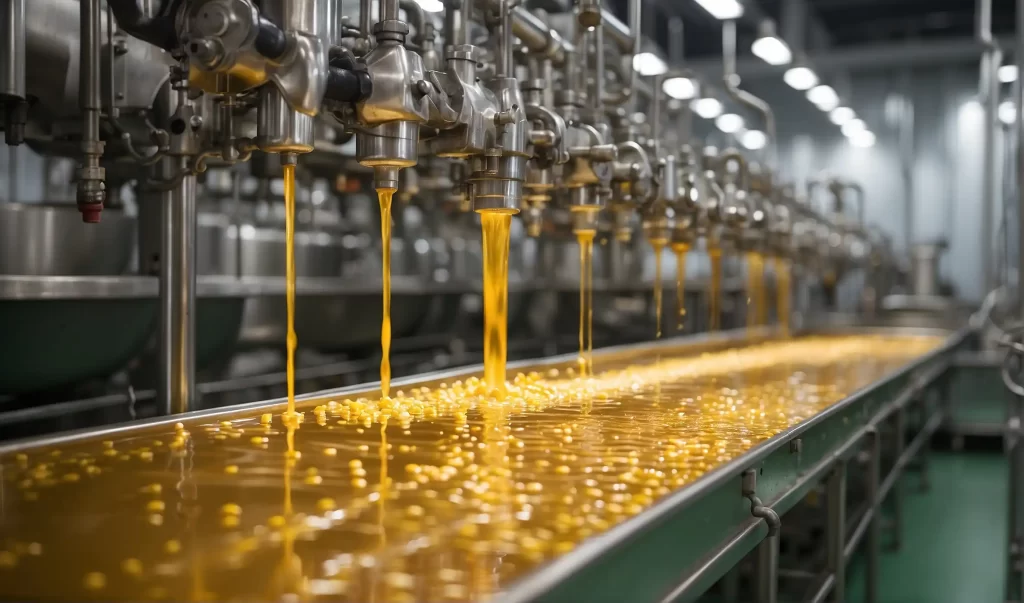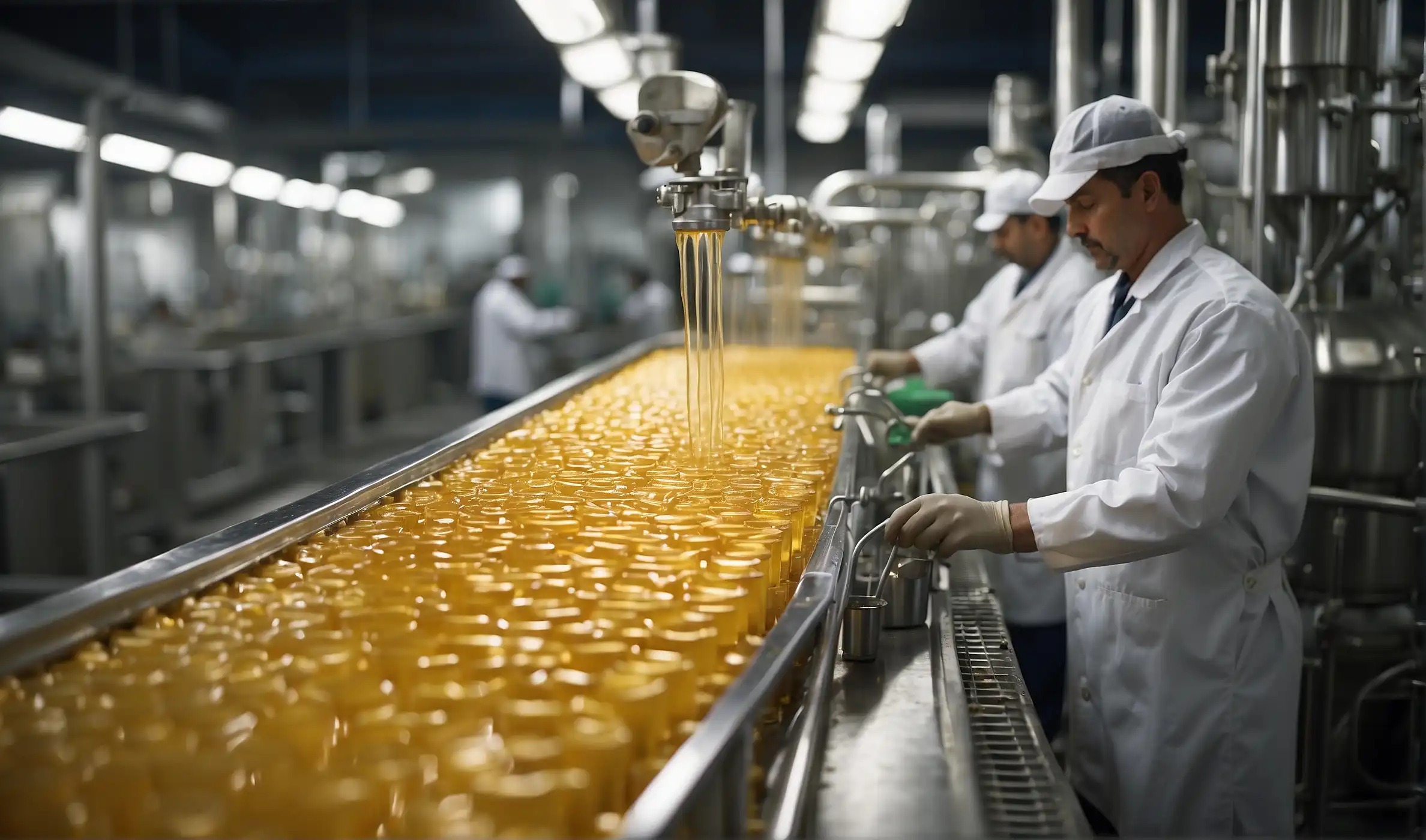High fructose corn syrup (HFCS) is generally vegan as it is derived from corn. No animal products are involved in its production.
High fructose corn syrup has emerged as a common sweetener in many processed foods and beverages, offering an affordable alternative to traditional sugar. Derived from the starch of corn, its production involves several enzymatic processes that convert glucose into fructose, achieving a desired sweetness similar to that of table sugar.
Vegans often seek clarity on ingredient sources, and HFCS fits their dietary preferences because it doesn’t necessitate animal inputs. As consumers grow increasingly health-conscious and environmentally aware, the vegan-friendly status of HFCS makes it a fitting choice for those avoiding animal-derived products, although it remains controversial among some health advocates due to its prolific use and associated health concerns.
High Fructose Corn Syrup Vegan Status
Many vegans question whether high fructose corn syrup (HFCS) is suitable for their diet. To determine the vegan status of HFCS, it’s essential to delve into its ingredients and sourcing. HFCS is derived from cornstarch, which undergoes enzymatic processing to convert glucose into fructose, creating a sweet substance widely used in the food industry.
The production process of HFCS involves two main enzymes: alpha-amylase and glucose isomerase. These are often produced by bacterial fermentation and are not of animal origin. Therefore, these aspects of HFCS manufacturing are generally considered vegan-friendly. However, uncertainties arise regarding the potential use of other inputs in the process that might involve animal derivatives.
Concerns about possible animal derivatives in HFCS relate partly to the filtration process. Some manufacturers might use bone char, a non-vegan material, to decolorize sugar. While this is less common in HFCS production and more associated with cane sugar, the traceability of all processing aids can be a challenge for those committed to a vegan lifestyle. Consequently, vegans might seek confirmation from manufacturers about their specific HFCS production practices.

What Is High Fructose Corn Syrup?
High Fructose Corn Syrup (HFCS) is a sweetener made from corn starch that has been processed by glucose isomerase to convert some of its glucose into fructose. As a liquid sweetener, it is often favored by food manufacturers because it’s less expensive and more stable in foods and beverages than sugar.
When comparing to other sweeteners, like sugar (sucrose) or honey, HFCS has a similar composition, thus it provides a similar level of sweetness. However, critics argue that the body metabolizes HFCS differently than other sugars, which may impact health outcomes. Its widespread use can be found in a variety of products like sodas, snacks, and sauces.
| Sweetener | Source | Caloric Value | Comparison with HFCS |
|---|---|---|---|
| Sucrose (Table Sugar) | Sugar cane or Sugar beets | Similar to HFCS | More expensive; crystalline form |
| Honey | Bee nectar | Varies | Natural sweetness; thicker consistency |
| Agave Syrup | Agave plant | Higher fructose content | Sweeter; believed to be healthier |
Vegan Diet Fundamentals
Veganism is a lifestyle choice that excludes all forms of exploitation of, and cruelty to, animals for food, clothing, or any other purpose. In the context of diet, vegans abstain from consuming any animal products or by-products, which includes meat, dairy, eggs, and honey. Ethical veganism extends beyond diet, also excluding animal-derived materials like leather and wool, as well as products tested on animals.
A food product is considered vegan if it meets certain criteria. First, it must contain no animal ingredients or by-products. Next, it should not be processed using animal products, such as bone char filtration which is often used in sugar refining. Lastly, the production process should not involve animal testing. These criteria help vegans make informed choices and ensure their consumption aligns with their ethical beliefs.
Identifying Vegan Ingredients
High fructose corn syrup (HFCS) is often a topic of debate within vegan circles due to its prevalence in processed foods. Typically derived from corn, HFCS is generally considered vegan since it does not directly contain animal products. The certifying process for vegan products encompasses both the ingredients and the production mechanisms. It is imperative to ensure no animal by-products are used at any manufacturing stage. Companies often seek certifications from reputable organizations to reassure consumers on the vegan status of their offerings.
However, some vegans might avoid HFCS due to potential concerns with cross-contamination or the use of bone char from animals in the refining process of corn. The issue of cross-contamination is particularly noted in facilities where products are produced on shared equipment with non-vegan foods.
| Non-Vegan Additive | Reason for Concern |
|---|---|
| Gelatin | Made from animal bones and connective tissues |
| Casein | A protein derived from dairy |
| Shellac | Derived from the secretion of lac bugs |
| Isinglass | Sourced from fish bladders |
Is High Fructose Corn Syrup Vegan Friendly?
High Fructose Corn Syrup (HFCS) is a sweetener that has sparked numerous debates in the health and dietary communities. Derived from corn starch, HFCS undergoes an enzymatic process converting glucose into fructose. This transformation results in a sweetener that contains varying proportions of fructose and glucose.
Primarily, HFCS consists of two main ingredients: fructose and glucose. These are simple sugars found in many plants and are considered vegan. The enzymes employed in HFCS production are sometimes derived from microbial sources, which aligns with a vegan diet.
Despite its vegan ingredients, concerns about cross-contamination arise due to the manufacturing process. HFCS is produced in facilities that might also process animal-derived products, potentially leading to cross-contact with non-vegan elements. Vegans should consider the HFCS source and the manufacturer’s processes to ensure the product aligns with a strict vegan lifestyle.
Ethical Considerations In Hfcs Production
The production of High Fructose Corn Syrup (HFCS) often involves processes that raise ethical questions among vegans. The core issue lies in the potential impact on animal populations and the environment. For instance, the loss of natural habitats due to industrial farming for corn can harm biodiversity. In certain cases, HFCS production may not align with vegan principles, which extend beyond individual dietary choices to encompass broader concerns about animal welfare and environmental sustainability.
Those following a vegan lifestyle scrutinize industrial ingredients, including HFCS, for any connections to animal harm or environmental degradation. Vegans often prefer to support sustainable and ethical product sources, favoring ingredients that reflect their commitment to causing minimal harm to animals and the ecosystem. A core tenet is to prioritize transparency in the production process, ensuring that their consumption does not inadvertently contribute to unethical practices.
Understanding Food Labels And Hfcs
Deciphering ingredient lists is crucial for vegans to avoid animal-derived substances. High Fructose Corn Syrup (HFCS) often presents a grey area in vegan diets. Predominantly, HFCS is derived from corn, a plant-based resource, suggesting that it is vegan-friendly. Nevertheless, the production process may involve bone char – used to refine sugar, thereby posing ethical concerns for vegans.
Certification labels serve as reliable indicators of vegan products. Labels like Vegan Action’s Certified Vegan logo signify a product free from animal products and by-products, including the likes of HFCS processed with bone char. Careful examination of these labels aids vegans in making informed food choices that align with their lifestyle.
Common Foods Containing Hfcs
High Fructose Corn Syrup (HFCS) is a sweetener that is commonly found in a variety of processed foods and beverages. The prevalence of HFCS in food products makes it an important consideration for those on a vegan diet. Some typical products that include HFCS are soft drinks, candies, baked goods, and certain types of bread. Vegans need to scan ingredient labels for HFCS to ensure the products align with their dietary choices.
Fortunately, there are plenty of vegan-friendly alternatives to these products. For instance, instead of conventional candies, vegans can opt for brands that use organic cane sugar or natural sweeteners. Similarly, vegan baked goods often substitute HFCS with maple syrup, agave nectar, or date syrup. Vegan breads are typically sweetened with fruit juices or simply do not include added sweeteners at all.
Debunking Hfcs Myths For Vegans
Many vegans are uncertain about whether high fructose corn syrup (HFCS) aligns with their dietary principles. A common misconception is that HFCS contains animal-derived ingredients. Contrary to this belief, HFCS is derived from corn starch, which undergoes an enzymatic process to convert glucose into fructose. Since the resulting syrup does not involve animal products, it can be considered vegan-friendly.
Debates over health implications have often overshadowed discussions about HFCS’s vegan status. Scientific studies suggest that excessive intake of HFCS may be associated with health concerns such as obesity and diabetes. Though the concern is valid for general health, it is separate from the vegan considerations. Hence, vegans focusing on health may also choose to limit HFCS, despite its vegan status, due to these potential health risks.
FAQs For Is High Fructose Corn Syrup Vegan
Is High Fructose Corn Syrup Considered Vegan?
High fructose corn syrup (HFCS) is generally considered vegan as it is derived from corn, a plant source. It doesn’t involve animal products or by-products in its production process.
What Are The Ingredients In High Fructose Corn Syrup?
The main ingredients in high fructose corn syrup are corn starch, which is processed to produce glucose, and then further processed to convert some of that glucose into fructose.
How Is High Fructose Corn Syrup Different From Sugar?
High fructose corn syrup and sugar differ in their production methods and ratios of glucose to fructose. HFCS is liquid and often contains either 42% or 55% fructose, contrasting with sugar’s consistent 50/50 fructose-glucose ratio.
Should Vegans Avoid High Fructose Corn Syrup?
Vegans may choose to avoid high fructose corn syrup due to environmental concerns or personal health preferences, but it’s not avoided for reasons of animal welfare or exploitation.
Conclusion
Navigating the nuances of veganism can be tricky with ingredients like high fructose corn syrup. This sweetener’s vegan status isn’t black and white. Ethical considerations around production methods are key. For strict vegans, research and personal values should guide your choice.
Always stay informed to ensure your diet aligns with your vegan principles.
To learn more about vegan-friendly farming practices and the production of plant-based products, keep updated with Farm Pioneer, your source for modern, sustainable agriculture.
